Nina MacLaughlin's Blog, page 12
March 14, 2017
Down the street,
a snowblower strains, huffing with a...
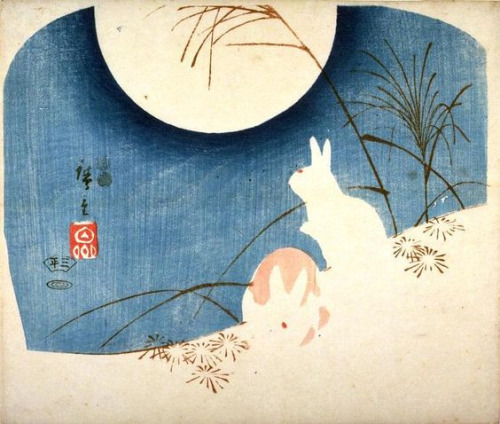
Down the street,
a snowblower strains, huffing with a machine-gun growl through snow heavied by
rain. Earlier, the wind blew hard, pushing clumps of snow off branches. The
clumps separated on their fall and were absorbed into the snow below in thwumps
I couldn’t hear. I have been daylong alone watching weather move and wondering
what it is about a snowstorm that makes one feel altered, elevated. The quality
of silence changes. The quality of light. A stilling and a newing. That the
world we live, the streets out our windows, can change in the span of a few
hours in a morning, it gentles us, and opens us.
Now, the smell
of gasoline from the snowblower drifts through the windows and brings my mind
to my mother mowing the lawn when we were small. I’ve never pushed a mower, but
I think I’d like it, an appeal in those simple see-your-results tasks. And I
can picture her after pushing the mower around our yard sitting at the kitchen
table, sweating, drinking a Rolling Rock, the wet, sweet smell of cut grass in
the air.
The seasons are
right now confused. In this in-between time, winter-spring, a
neither-here-nor-thereness, and it makes an ache. A simultaneous latch to what
was and anticipation to what might come. The seasons stumble. They flail –
seventy degrees one week; snowstorm the next. Each day’s weather asks: what way
to be? What way to be? The purple tips of crocuses press through mulch. In the
mornings: light and birds. Mourning doves, cardinals, and the robins are back
now, too. Seven fat ones jostled at the end of a driveway yesterday. An albino
squirrel lives nearby and I see it sometimes on early walks, white like the
Full Worm Moon two nights ago. Seeing it seems like a sign. But I don’t know
for what.
March 10, 2017
Brazilian walnut, cedar, fir. The triad of
woods...
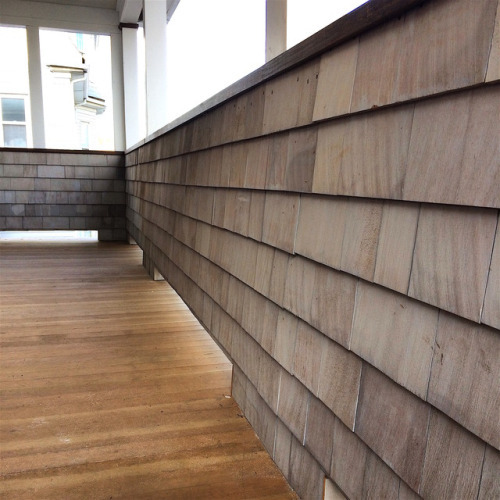
Brazilian walnut, cedar, fir. The triad of
woods from decks we built this winter brings ice cream to mind, vanilla chocolate strawberry. Like the
ice cream, each wood with its own specific scent and texture – the Brazilian
walnut dense, chocolaty, with notes, when it’s cut, of cinnamon and burnt
marshmallows. The cedar is bright and
light, the smell of pencil in your hand, of sauna, of mothproof closets, a
sparkling sort of smell, less earthy and more of air somehow, a scent that
moves on a breeze rather than rising out of soil. The fir, with its pink tints,
is gentle like the strawberry, and the tongues slipped tight into the grooves
to make the floor on this deck. Unlike the ice cream, I do not know the tastes
of these woods, though I remember my shock eating pine nuts and putting together
that the small ivory nut I put in my mouth came from something forest-born, and
was able, for the first time, to taste tree. A whole palate, a whole spread and
range of flavor, that will remain mostly unknown. A strange crave strikes now for
eating trees, and a strange sadness for all that we don’t get to know.
February 10, 2017
“I’m driving to D.C. to make my body useful,” a friend said
in advance of the protest on January 21....
“I’m driving to D.C. to make my body useful,” a friend said
in advance of the protest on January 21. I was grateful he put it this way – it
helped frame my thinking about what it means to object. Not everyone can be a
revolutionary, not everyone can lead a movement, but a lot of us can be bodies
in the street. There’s use in that, and power, a body added to a crowd of
bodies trying to make a point.
Bodies have been on the brain. About rights and choice and
freedom to move, about owning your own specific sack of flesh and what it is to
have what you can and cannot do with it, where you can and cannot go, dictated
by people in power who are racist and sexist, who are villainous, corrupt, and
moronic.
How to feel useful? It’s tricky. For me, here, in my small
life in Cambridge, carpentry work has reached its annual winter pause, much
later into the colder months than usual, and I’ve gone from using and moving my
body all day to being still at my desk, or piled on the couch under
blankets, computer on my lap, shifting into full-force writing mode. How to feel
useful, in body or in brain? These questions surge, more so now, maybe for many
of us, and they’re important, and they are tiring.
This epidemic of exhaustion. Part of it, I think, comes from
an inundation of meaning. In love and in crisis, everything has the potential
for metaphor. The bulb blowing in your nightstand lamp, the lean of trees in
the wind, a crowd of crows lifting from a rooftop like the shadow of clapping
hands. Falling in love is thrilling, and tiring, because there’s meaning in
your cereal bowl, your pair of socks. It’s an exhausting way to be, when meaning
is deepened and you don’t know what’s meant. The same, I think, is true in
moments of breakdown and crisis. There’s doom – or hope – in the pitch of a
lamp post, in the passing expression of a stranger on a train, in the maniacal
all-caps blasts from a tyrant. I guess in either it’s worth staying awake.
January 13, 2017
HAMMER HEAD was translated into Chinese and I love the cover so...
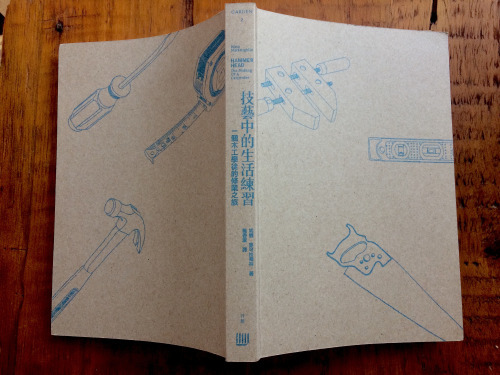
HAMMER HEAD was translated into Chinese and I love the cover so much. The amazing tool drawings are by Joseph McVetty.
January 10, 2017
Types of happinessThe happiness of watering the plantsThe happiness of having a beer placed in front...
Types of happiness
The happiness of watering the plantsThe happiness of having a beer placed in front of yousitting next to someone good to talk withThe happiness of coming back into the air from
being under waterThe happiness of finishing
Types of sadness
The sadness of the end of a stormThe sadness of a boot on the floor that slumpsat the ankleThe sadness of a pillow when it’s taken out of
its caseThe sadness of finishing
December 28, 2016
Work on a deck has gone long, deeper into the colder months
than...

Work on a deck has gone long, deeper into the colder months
than we’d hoped. We have been outside these last weeks, with handwarmers tucked
into our work gloves, wearing double the usual amount of pants.
Working outside tends to focus attention towards simpler
things: temperature, wind, the sun’s low path as it shifts above, then quick
behind, the peaked roofs of this one-way street in Somerville. Winter light is
better light, purer and more interesting. It brings a clarity and a glow that’s
lost April through October. I like being outside in it.
We shed layers as we warm and pull them back on as the sun rides
west and low and we’re left in late-afternoon shadow. A moment comes each
afternoon, pulling on a hood or re-buttoning a vest up the neck, when one or
the other of us says, “Colder.” Everyday it happens, and it is real, this
registering of change, this daily cooling, and it seems something somehow to
treasure: it does not get boring.
December 8, 2016
Before, after.It rained this morning. In the afternoon, the sun...
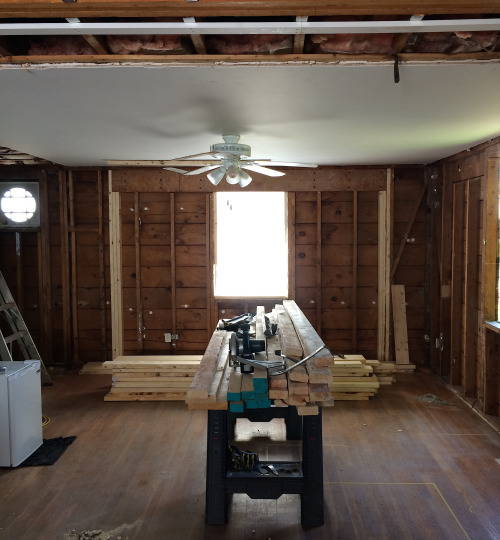
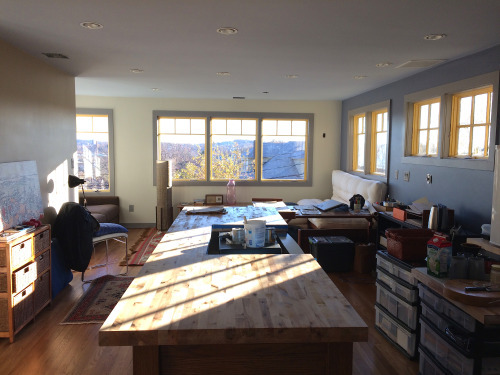
Before, after.
It rained this morning. In the afternoon, the sun did its
best to press through the thickness – not clouds, it didn’t seem, more an extra layer, as
though the sky had pulled a sheet over itself, like light was trying to shine through
light. The sky was white-grey in the way December skies are white-grey and the
sun, when it presses through, takes on a look more lunar, pale, like silver
skin stretched across a loin.
I’d been crouching over a showerbed all morning, grouting
tiles. My view was floorward. The room was warm and dim. I left the bathroom
and walked into the livingroom we’d made with all the windows we’d put in and
light was pouring through, magic, wet, post-winter-rain light. I gasped and
gushed, look, oh my gosh, the light!
The man whose house it is – whose life we’ve been a part of off and on for
months now as the job has expanded and contracted, as we’ve cut holes into the
side of his house, built new rooms, brought the light in – he sat on a couch in
the corner. “I know, I know,” he said, “it’s beautiful.” We both looked out and
looked how the light entered in. “My mother had an expression,” he said. “I don’t
remember the Russian, but for light like this, she said the witch’s daughter is
getting married.”
She was a proud bride today, with a supernatural glow.
December 5, 2016
Anne Carson and Mary Ruefle’s work thrills not just for the...
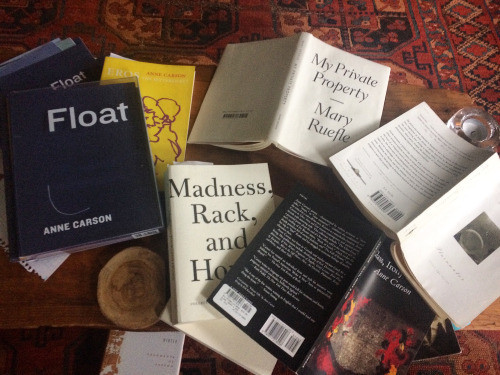
Anne Carson and Mary Ruefle’s work thrills not just for the pleasure and surprise of their
language, but for how they allow us in on something otherwise so secret,
so private, the very leaps and dances and stumbles of their own actual
thrumming minds.
There are few writers I love more than Carson and Ruefle. I wrote about their new books for the LA Review of Books. Give it a read.
November 21, 2016
From the tower at the Mount Auburn Cemetery in...
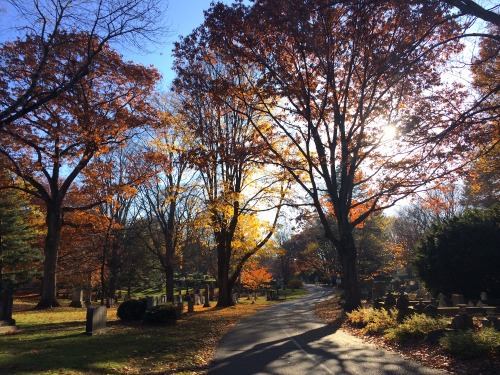
From the tower at the Mount Auburn Cemetery in Cambridge,
Massachusetts, one stands above the gravestones and one stands above the trees.
The Boston skyline spreads itself along the horizon to the south; the Harvard
Stadium across the river looks ancient, Roman; there are mostly trees to
the north with steeples spearing here and there. On Saturday afternoon around
two, the sun already on its downward slink here at the end of the year, the oak
leaves took the light like new leather: they shone. Nine people crowded at the
tower top. Some gestured at bright trees. Others named buildings. A woman
pointed out where she lived, ‘over there, by Fresh Pond, see those three
towers?’ Above the earth, the graves, it seems, get forgotten. Here we are in
the sky! A whole city unfolds below us! All these trees showing off! The
elevation offers a more definitive sense of you
are here, one that’s harder to hold onto back down on earth where the
graves are silent as light and each thudding footfall seems to punctuate impermanence.
Wind isn’t wind but ghosts in the graveyard. And on Saturday afternoon, back
down on earth, everything felt leaden in its temporariness. I looked for
someone who I hoped also might be walking there that day. I needed a reminder: you
are not a ghost.
November 17, 2016
We climb the ladder to the deck we’re building on the...

We climb the ladder to the deck we’re building on the second
story. We laid the fir planks last week, lovely in their dusky pink-gold color,
so we stand on solid ground. But there are no rails and there is a definitive
sense of drop, an edge right there, always fall-off-able. It does not feel
unsafe exactly, but it ups the awareness of where your body is in space. It is, I’ve found, tiring to stay aware of where your body is in space. It takes it out of you. And it makes me realize how much I take for granted not being aware of where my body is in space, how moving down the sidewalk, I do not have to anticipate each shift of weight. Vigilance is tiring. Paying attention is tiring. Falling off the edge is worse.
We carried ladders up the ladder to frame the roof over the
second story deck, still higher in the sky, and we looked over the neighborhood
from the point of view of mourning doves, or the little speckled finches that
nest in the eaves, that ditter in and out above our heads all day, maybe
thickening their own nests as the sun drops earlier and it hits freezing in the
nights.
Like any job, like any situation of work, like anything,
actually, like being alive, there are good days and bad days. There are good
weeks and bad weeks. And though it would feel wrong to call this a good week, it is one that I have felt
grateful to have my hands and mind occupied by simple physical tasks (cutting
rafters, climbing ladders, staying aware of where my body is
in space), and by interactions with simple
physical materials (two-by-eight planks of pine, a pencil, a hammer). It’s
not helping the way it usually does, but it’s helping a little bit, and I will take what I can get.



